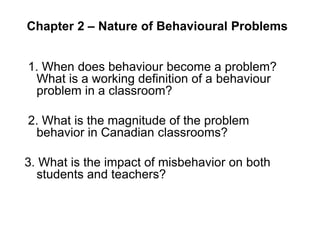
Chapter 2: Nature of the Discipline Problem
- 1. Chapter 2 – Nature of Behavioural Problems 1. When does behaviour become a problem? What is a working definition of a behaviour problem in a classroom? 2. What is the magnitude of the problem behavior in Canadian classrooms? 3. What is the impact of misbehavior on both students and teachers?
- 2. Defining a Behavioural Problem – p.25 When teachers use generic language like – “lazy”, “rude”, “aggressive”, “unmotivated”, “belligerent”, “inconsiderate” to describe students - their thoughts “attribute” to their behaviour towards students. Attribution Theory (Weiner, 1980) tells us that our thoughts guide our feelings, which in turn guide our behaviour. How effective is a negative teacher reaction or judgment in effecting a postive change in student behaviour? – Is a negative reaction better than no reaction?
- 3. Defining a Behavioural Problem Does behaviour lead thinking or does thinking lead behaviour? So if we change the way we behave do we change the way we think? So if we change the way we think can we change the way we behave?
- 4. Behavioral Scenarios 6 Compare scenarios (p. 27-28) * Is there a behavioural problem? * If there is a behavioural problem, who is exhibiting it? * Does the behaviour require discipline or intervention?
- 5. Definition of a Behavioural Problem – A definition that recognizes the multifaceted nature of a behavioural problem: “A behavioural problem is a behaviour that: (1) interferes with the teaching act, (2) interferes with the rights of others to learn. (3) is psychologically or physically unsafe, (4) destroys property.”
- 6. Beyond the Definition – Motivational Problems Student behaviours like: not handing in homework, not prepared for class, daydreaming fall outside the “definition” Why?
- 7. Dealing with Motivational Problems Motivational Problems can be a result of: • low levels of self confidence • Low expectations of potential success • Loss of autonomy • Achievement anxiety or • Fears related to success or failure
- 8. Extent and impact of behavioural issues in Canadian schools Levels of satisfaction with the “education system” vary across Canada, however 40% (1999) of Canadians surveyed had concerns about discipline/violence in the public school system. What might be the results for the private school system? Why? Some of the reasons given for teachers leaving the profession early are student behaviour or the working environment.
- 9. Common Classroom Behaviours Excessive talking Failure to do assignments Disrespect Lateness Why is it so hard to overcome these?
- 10. Bullying – a growing concern Bullying refers to: the physical and/or psychological abuse of power by peers (usually children against other children) and can be either verbal or physical, and direct (face to face) or indirect (gossip, cell phone messages,exclusion, shunning, text messages, internet sites etc.) What is the impact of bullying?
- 11. Impact of Disruptive Behavior (DB) on Teaching and Learning Level of Interference = type + frequency + duration in teaching of DB of DB of DB & learning In a 40 week school year – 1000 minutes/22 periods or 1/9 of the year is spent on off task behaviour.
- 12. The Ripple Effect • The Ripple Effect results when disruptive behaviour becomes contagious and draws in other students – there is a “percolating” effect. • Students can learn and subsequently model off-task behaviours from other students. • What might be some factors that contribute to the ripple effect?
- 13. Teacher’s are Emotionally Vulnerable to Disruptive Behaviour When the hours spent to create interesting, motivating, fun and meaningful lessons are undermined by disinterested, off-task students, teachers can become discouraged and burnt out. 20% - 25% of teachers leave within 5 years In urban settings close to 50% leave in just 3 years
- 14. Danger of focusing on the “negative” Just focusing on negative behaviour can reinforce it and opportunities for students to learn more appropriate behaviours can be missed. Disruptive behaviour evolves over time and it will take to make positive changes – small steps with a high success ratio. Behavioural standards need to be realistic and universal to the entire class.
- 15. Spinning out of control! As discipline problems escalate, teachers can adopt a “ laissez-faire” attitude. As escalation continues a “get even” attitude leads to revengeful behaviours on the part of the teacher which can limit their ability to assist students learn – power struggles can place a teacher in a no-win situation.
- 16. The fallout! Stress related to classroom management is one of the most influential factors in failure among novice teachers. Seasoned teachers report that students who continually misbehave are the primary cause of job stress – “If it weren’t for the students this would be a great place to work!”